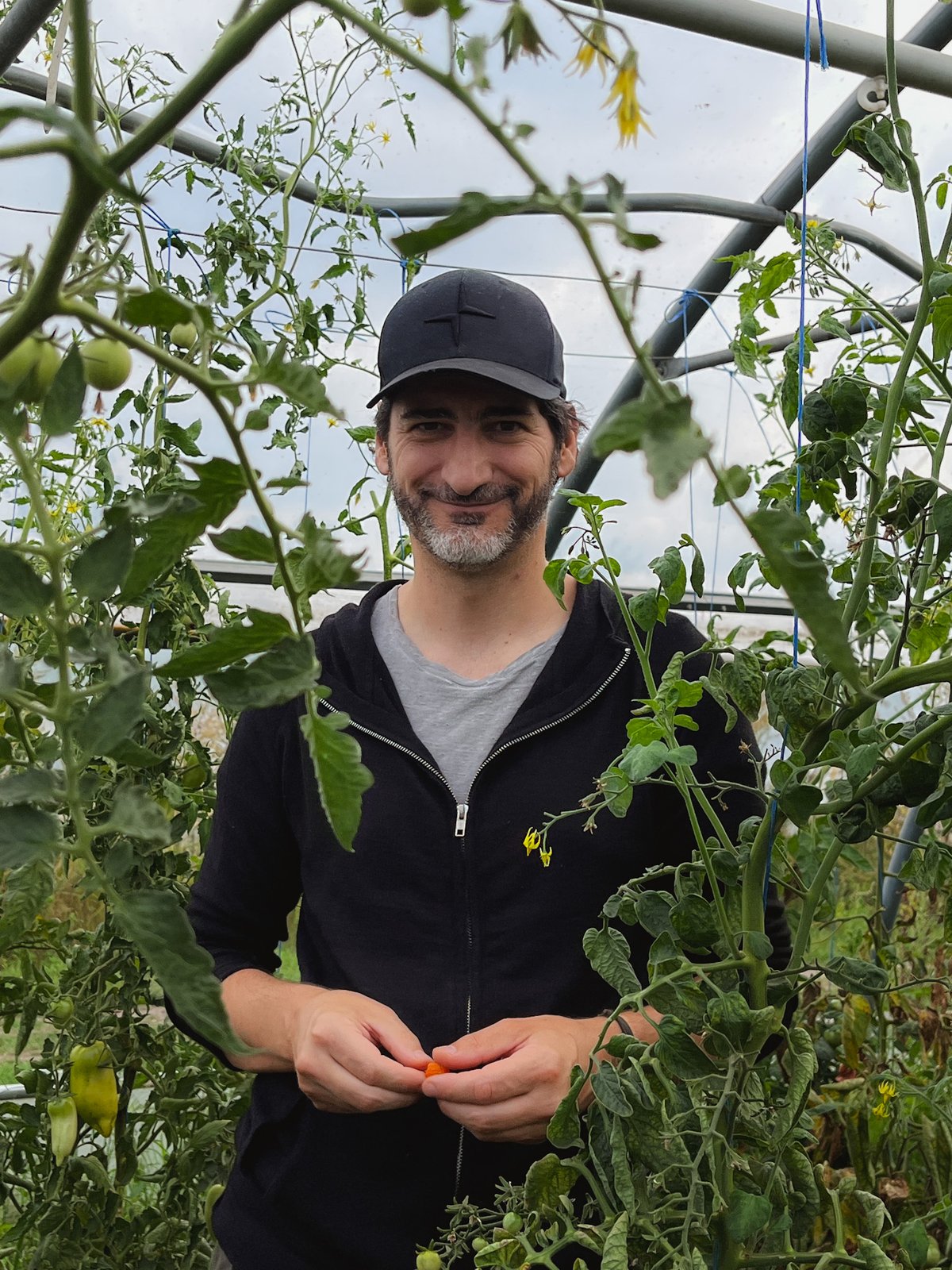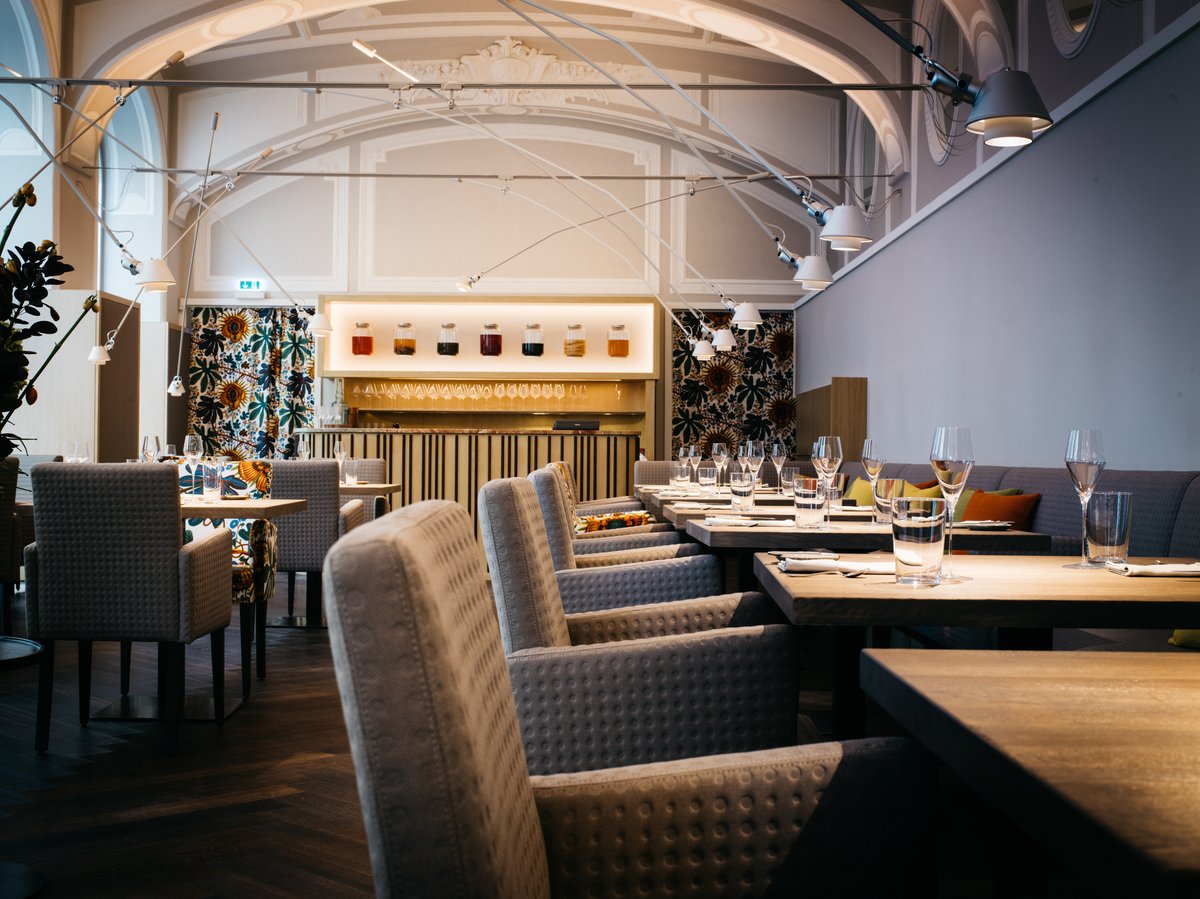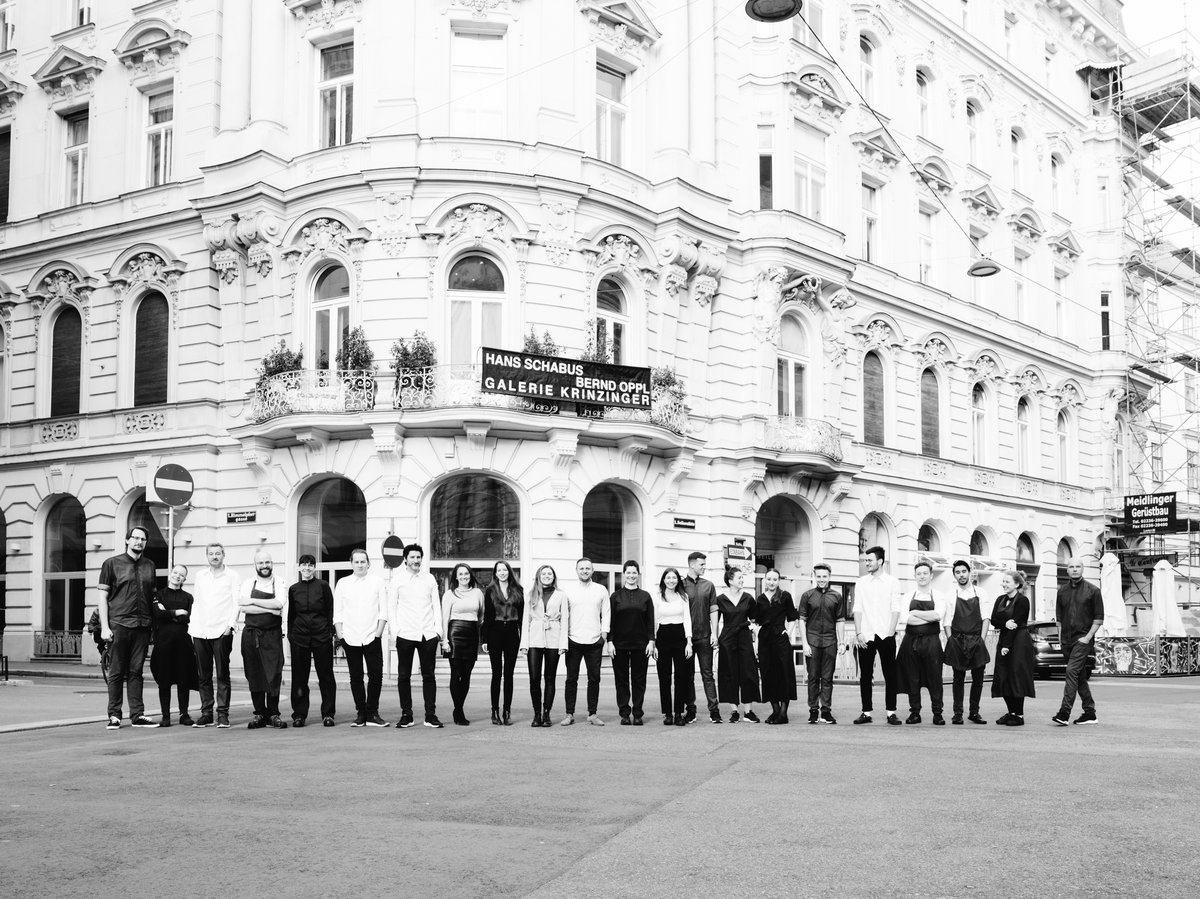Unveiling Tian: The Transformation of Vegetarian Fine Dining in Vienna with Chef Paul Ivic

A mere decade ago, the notion of a fully vegetarian menu within the hallowed portals of a fine dining establishment in Vienna was an unimaginable prospect. Indeed, to even locate delightful vegetarian options within the gastronomic landscape would have been an endeavour of Herculean proportions. This was the culinary panorama against which Austrian chef Paul Ivic bravely embarked on his vegetarian journey as the head chef of Tian restaurant in 2011.
Hailing from Tyrol and steeped in Croatian heritage, Ivic’s culinary finesse was meticulously honed in distinguished dining establishments across Germany, Austria, and Switzerland. Although not an ardent vegetarian, Ivic treads the path of dietary equilibrium, wherein meat proteins feature, albeit sparsely.
The spark to immerse himself in the intricate art of vegetable-centric cuisine, which at that time bore no correlation with the elevated realm of fine dining, was a challenge that Ivic dared to embrace. He reflects, «Our culinary expedition commenced with a rather conventional menu, subsequently morphing into the sophisticated dining entity we represent today. It’s the recollection of this transformative experience that binds my team in resilient camaraderie, a testament to the remarkable journey we’ve undertaken».

chef Paul Ivic at Erich & Priska Stekovics farm
Ivic had always harboured unwavering clarity about his vegetarian culinary philosophy. His cuisine sought to unravel the multifaceted potential of an ingredient, accentuate its unique characteristics per each fleeting micro-season, and present it in an innovative avatar bereft of imitating the nuances of meat or fish.
Reflecting on the nascent stage of his gastronomic adventure, Ivic admits, «We commenced our journey devoid of comprehensive know-how, necessitating extensive research. The absence of existing guidelines obliged me to craft my unique culinary language».
Ivic’s pioneering crusade and persistent endeavour to elevate vegetarian cuisine culminated in the conferment of a coveted Michelin star in 2014, an honour that has since remained steadfast. This noteworthy accolade, coupled with an ever-growing clientele and a resilient staff, fortified Ivic’s faith in the potential of vegetarian gastronomy.


Priska Stekovics, co-owner of Erich & Priska Stekovics farm, Ivic's supplier of tomatoes and onions

Priska Stekovics, co-owner of Erich & Priska Stekovics farm, Ivic's supplier of tomatoes and onions

Wolfgang Palme from «City Farm Augarten»

«City Farm Augarten»
Ranging from an eccentric vinegar producer who consistently adheres to ethical principles, to a family that nurtures an astounding variety of over 3,200 types of tomatoes near the picturesque Neusiedlersee, and the enchanting «City Farm Augarten» – an agrarian oasis and workshop curated by Wolfgang Palme, with whom Ivic frequently exchanges inspiring ideas on ethically growing food:
«We collaborate with 25 small-scale food producers. Along with our partners in Munich, Zürs, and Zadar, our total supplier count exceeds 50. Those who commit exclusively to biodynamic production are an invaluable asset to our kitchen and enhance the quality of our dishes. These producers ensure that nature endures unscathed. Despite our considerable research efforts, numerous suppliers progressively gravitate towards us», reveals Ivic.
Ivic belongs to that rare breed of chefs who strive to curate exquisite culinary experiences and aspire to enlighten their patrons. His choice of ingredients for your plate is a profound statement. As we traverse the idyllic Austrian countryside with him, acquainting ourselves with his cherished and uniquely innovative producers, Ivic often indulges in introspective interludes and proffers eloquent discourses expressing his disdain for industrial agriculture and the urgent necessity to preserve biodiversity, particularly the ancient varieties.
In his esteemed flagship restaurant, Tian, Ivic showcases a complex assortment of vegetable-based dishes, unafraid to celebrate the humblest of ingredients and seize every opportunity to reincarnate traditional flavours. For instance, the «Back to the Roots» course, a sublime constituent of the Tian dinner tasting menu, presents an intricately constructed dish featuring pure wheat sourdough bread, sophisticated bites, and a comforting homemade soup. Accompanying this is homemade kefir sour cream butter infused with an amino sauce of toasted, smoked bread and grilled wild garlic.
Complementing Ivic’s culinary artistry is André Drechsel, the restaurant manager and sommelier at Tian for the past five years, who was recently bestowed with the accolade of Best Sommelier of the Year 2023 by Gault& Millau. Drechsel’s effervescent personality and meticulous attention to detail enhance the dining experience. His uncanny ability to pair Ivic’s intricate vegetable dishes with exquisite natural wines is remarkable.
In sum, our two-day sojourn exploring the Tian ecosystem offered us a profound insight into the realm of vegetarian dining in Vienna and a privileged glimpse into Ivic’s reflective musings on Tian’s evolutionary journey.

Tian team. Ingo Pertramer
Please tell us about the restaurants that are currently under the Tian brand
Our flagship, the TIAN Restaurant, is located in Vienna. On 40 seats, we want to give our guests an understanding of our visions of vegetarian cuisine. This is where our journey started and where the development for all further locations of TIAN and our projects take place. A place exactly like I imagined it.
In Vienna, we do have the TIAN Bistro also. There we offer a shared menu—a concept that is very important to me. Furnished with 120 seats, we can serve a lot of guests with a dynamic product. True to our motto, „Es lebe das Leben“ (Here ́s to life), I really love to see families and friends get together, and just like in Croatia, togetherness is a priority.
In the Hotel Edelweiss in Zürs (Austria), we currently run a third restaurant of TIAN during the winter season. In the summer, we visited Zadar (Croatia) in the Hotel Falkensteiner Punta Skala.
Every location has to have its independence, but we want to contribute our DNA.
What do you think about the growing vegetable trend in restaurants seen more and more around the world?
It is just great. Is there anything better than discovering new tastes and lived diversity on the plates? It is necessary to develop in this sector. Our eating and buying behavior has a very strong impact on ecology, the economy, our social behavior, and our health.
How was the beginning of this journey for you? I remember you faced some negative feedback in the early days of Tian.
When we started in 2010 in Vienna, especially the first years, have been tough. People did not know what to do with vegetarian and vegan cuisine, as I imagined.
They knew tofu and chickpeas but not the fascinating range of vegetables. A lot of guests were surprised at how intense and tasteful our vegetarian cuisine is. Not bound by dogma but in search of the best quality provided by outstanding cooking trade. Clearly, we didn’t ́t have much know-how, so we had to do a lot of research.
I had no guidelines this time, so I had to generate my own cuisine.
What are the main techniques you apply for vegetables in your kitchen? What do you think about restaurants that work vegetables the way they lose their identity in search of being similar to meat?
I always wanted the vegetable to be the main character. It’s just stunning what flavors there are when vegetables are grown correctly. The quality of soil and the farmers’ knowledge are making big differences. We try to support this.
What place do vegetables have in Austrian cuisine, which relies heavily on meat?
Slowly but surely, it is getting more important. There are a few chefs who know how to place the vegetables right. But often, it is unattended and only a side dish.
How do you feel the perception of vegetable-driven menus has changed through the years?
I figured out that in Austria, we do not only have 4 seasons but 12. Every month offers a different vegetable. For example, a carrot grown by the same farmer can taste different every week because the weather changes. For me, it is thrilling and an adventure to discover something new permanently.
What are the specifics of working with the vegetable menu during the winter season?
The length of winter. April is especially challenging because we work with regional producers who are working seasonally. What I mean by that) After a cold and grey winter, we all crave the taste of spring. We decided to work with local producers; therefore, we experience a time zone defined by nature. When others are serving spring vegetables already, we still have winter vegetables. But in a wide range.

Ingo Pertrame

Ingo Pertrame

Ingo Pertrame

Ingo Pertrame
How does the kitchen work change when no meat is involved?
It is constantly improving independently, and more and more people accept it.
How does the restaurant change from an economic perspective when you don’t serve meat or fish?
Guests are not willing to pay the real value of a vegetarian or vegan menu. Mostly it is easier for them to pay 50- 70€ for a piece of steak. A menu with caviar and turbot conveys paying more money, and the willingness to pay 200- 400€ for a menu is more accepted.
Let me give you an example:
Most people use bones for making their sauces. One kilogram of bones costs about 80- 99 cents. Others add as well parures of meat. One kilogram is about 3,50€.
We cook sauces with mushrooms. The price per kilo of mushrooms we use starts at 18€.
What do you think keeps staff members with you for a long time? Please tell us their names, positions, and how long they have stayed with you.
That is a question my staff members should answer. I think it is because we are working at eye level.
Thomas (chef of patisserie), Mathias (chef de cuisine), Florian (executive chef), and Aleksander (chef de rang) have been working with me for 11 years already.
Simon (sous chef) and Peter L. (chef de cuisine in Zürs) are starting their tenth year.
Peter Trattner (assistant restaurant manager) 8 years, Michael P. (sommelier of nonalcoholic drinks) 7 years.
Over more than 5 years with me are André Drechsel (restaurant manager and sommelier), Michael M. (chef de cuisine in TIAN Bistro), Nico (Sommelier), Agboya and Yassin (kitchen assistant), Nina (Marketing), Flo B. (junior sous chef)
For the past 4 years, I am happy to work with Caro (chef de rang), Markus (assistant executive restaurant manager), Timea (chef de partie), Katharina (controlling), Fiona (patisserie), Regina (commis de cuisine), Robert (restaurant manager), Christina (restaurant manager), Carina (chef de rang).
And many staff members have been in the company for over 2 years—45% women and 55% men.
Can a chef lead his team as a community rather than a strict brigade-system worker?
Captain Kirk was able to do it. Jean Luc Picard did it. Every system does have its right to a specific date. I want to work with people, develop something new together, and share my excitement. I want to work with people who I like to support and who like to support me. A flat hierarchy needs trust and stable personalities. I think it is like an orchestra. The conductor has a huge responsibility that all members harmonize and present his musical work perfectly. It is his task to find the perfect position for each member.
Above all, a chef must like himself in order to like others.
What do you think it means to be a good leader in the kitchen nowadays?
Those who empower others to reach their full potential are good leaders to me. To lead emotionally intelligent and to face the team at eye level without losing the focus on the importance of quality and the constant of a good performance.
And what is also important is that no leader can do everything or has to be able to do so. A person with this knowledge and a stable ego is a good leader, in my opinion.
A restaurant consists not only of a kitchen but of good service and a back office.
It is like climbing a mountain. The higher the mountain, the more important it is to have a well-trained team with team members who support each other.
Life is not a one-man show.
